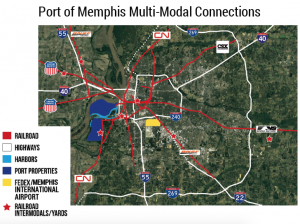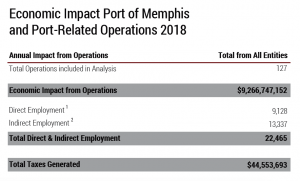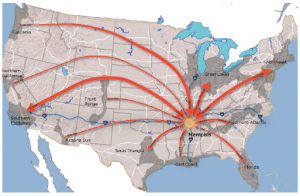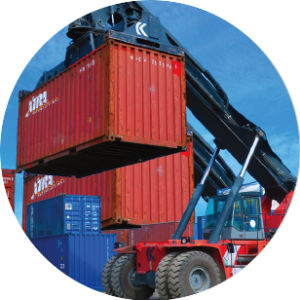The Port of Memphis is the second largest inland port on the Mississippi River. It consists of three separate slack-water harbors: Pidgeon Industrial Harbor and McKellar Lake Harbor just south of downtown Memphis and Wolf River Harbor in the northern part of the city. Port properties include two major industrial parks, Pidgeon Industrial Park and President’s Island.
Waterborne operations within the Port of Memphis handled 12.2 million short tons in 2016. The value of products handled through the Port of Memphis has increased significantly over the past decade as more manufacturing operations use the Port for transporting finished components.
Economic Impact
The overall economic impact of the Port of Memphis and the business entities operating within its jurisdiction is $9.27 Billion annually. This figure is the value of all goods and services produced within the Shelby County economy as a result of the Port and its related operations. This does not include the one-time impact of capital investments made by port-related entities each year.
Distribution & Logistics
Because of its central North American location and transportation infrastructure, Memphis is known worldwide for its multi-modal distribution and logistics capabilities. The Port of Memphis is the central element in that transportation infrastructure.
The Port of Memphis is located at one of the few points in the U.S. where cargo can cross the Mississippi River by rail and truck. Interstate 40, Interstate 55, Interstate 69 and seven major U.S. highways converge near the Port of Memphis. Cargo arriving at the Port of Memphis can reach more major markets overnight by truck than from any other city in the U.S.
Port of Memphis Strategic Location
Unique North American confluence of north-south and east-west facilities
- Interstate highways
- Class 1 rail lines
- Mississippi River & inland waterways
- Memphis International Airport/FedEx Headquarters and Global Hub
- Energy pipelines
Five Class I rail systems serve Memphis: BN, CN, CSX, Norfolk Southern and Union Pacific. A rail to truck inter-modal terminal is located in Frank Pidgeon Industrial Park within the Port of Memphis.
The only petroleum refinery in Tennessee is located at the Port of Memphis. Pipelines and storage facilities supply fuel to major regional industries and to the Memphis International Airport. Located approximately 10 miles away, the airport is the global hub for FedEx.
Storage
- The International Port of Memphis has six grain elevators which have 2,238 feet of berthing space, supplemented by 50 concrete silos and 25 steel tanks with storage capacity of over 12.3 million bushels.
- Liquid bulk commodities are handled by 18 facilities that have 6,313 feet of berthing space and approximately 130 storage tanks with a total capacity of 88,956,750 gallons.
- Dry bulk commodities are handled by eight facilities with 4,404 feet of berthing space and storage capacity of approximately 581,000 tons.




